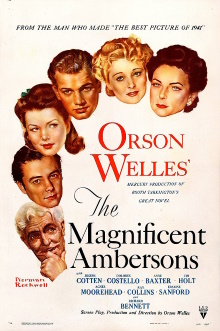This film by Orson Welles is both shorter than it was meant to be and looks older than it should. The reason for the first is that the studio edited and cut the final film against Welles’ wishes and for the second is that it’s meant to show the grand old times before the age of the automobile. There are quite a few bits in it that I liked, such as Welles’ narration of how the rich old families used to live. Yet on the whole this didn’t work for me. The romance between the two leads is central to the story but Welles is I think not a very good director of romances. The butchering by the studio is also very visible and completely ruins the ending.
The Ambersons are the richest and most influential in their town and flaunt that fact. The heiress of the family is Isabel Amberson and the townspeople gossip over who she will marry. It is clear that she and Eugene Morgan, an inventor working on automobiles, love each other but when he embarrasses her on one occasion, she marries another man Wilbur Minafer. Eventually Eugene moves away and Isabel and Wilbur have a son George who is grows up as the spoiled terror of the town. Twenty years later, Eugene returns a widower with a daughter Lucy in town. George is a young man who enjoys the life of the idle rich with no ambition to do anything more. Naturally George is instantly attracted to Lucy even as he dislikes her father Eugene and is disparaging towards the rise of the automobile. However it is also obvious to everyone except George that Eugene and Isabel are still in love with each other. Meanwhile the fortunes of the Ambersons are declining along with Wilbur’s health while the success of the automobile industry is making the Morgans rich and changing the character and landscape of the town they all live in.
It’s evident that the hour-and-a-half running time of this film is too modest to fulfill Welles’ ambitions here. The narrator, Welles himself, primes us to expect the downfall of the Ambersons and the comeuppance of the spoiled man-child George. Yet it also wants us to despair at the missed romance of Eugene and Isabel and lament that the age of automobiles have changed the world probably for the worst. Not only are there too many things going for, there’s also mixed messaging. Ambersons lord it over their town but only George is painted as the villain and never Isabel who pampered him to be the way he is. We’re meant to admire the jovial nature and industriousness of Eugene Morgan but regret the passing of the old world he helps bring about. Personally I feel that the downfall of the Ambersons makes for the more compelling story with the rise of the automobile being the revolution that cause old fortunes to decline and new ones to arise. The romance between Eugene and Isabel is an unwelcome distraction. You probably need a whole television series to properly do justice to the soap opera drama of romances and jealousies between rival grand families. It may even be that this film was a precursor to such shows that were later made but that doesn’t mean it itself was well executed.
The film’s ending, reshot by the studio against Welles’ wishes, further weakens it in trying to offer George some respite. The ideal ending would be to show the Morgans as the new kings and queens of the town but it doesn’t do that either. In general the entire sequence showing the decline of the Ambersons is too short to have much emotional impact. I originally added this to my list because it’s been described as a classic that is nearly as good as Citizen Kane. After watching it, I have to say that it really isn’t.
